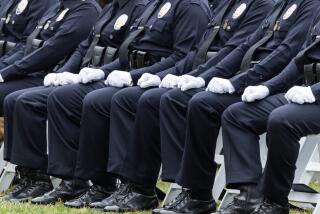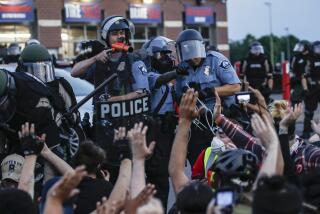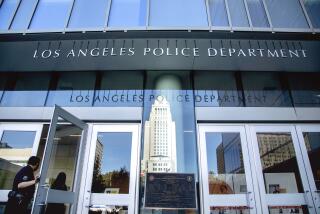LAW ENFORCEMENT : Canada Police Face Charges of Racism, Excessive Force : Ontario officers cite safety, resist new regulations that will require filing of a report every time a gun is drawn.
TORONTO — Americans aren’t given to thinking of Canada as a land where a sour and politicized police force would mutiny against a civilian government. After all, what country besides Canada employs its federal law officers--the Mounties--as a tourist attraction and symbol of rectitude?
But now police in Ontario, Canada’s largest province, are waging a low-grade insurgency against the reformist government here. Things haven’t quite deteriorated to the level of pre-riot Los Angeles, where the police chief and the mayor went for months without speaking. But the preoccupations are the same here as in Southern California: charges of institutional racism and the use of excessive force.
On the surface, Ontario’s police dispute is a simple matter: The government has written new regulations that will require an officer to file a report every time a gun is drawn. (Until now, police have had to report only when they fired a weapon.) The rules are to take effect Jan. 1.
But the police refuse to comply, saying the new rules will compromise their safety. They say officers will think twice (“Will this report be used against me?”) before unholstering their guns, and some will be shot dead while mulling it over.
The dispute has its roots in a number of racial incidents that have polarized public opinion on crime and alleged police racism. The police may not really object to the new regulation per se as much as to the message it sends: that the incidents have convinced the government that the police are guilty of racism and need to be kept in line.
Over the past four years, eight blacks have been shot by police in Toronto, Canada’s largest city. The shootings have provoked drawn-out investigations, and in each case the officers involved have been cleared.
Last May, two white officers were acquitted in the shooting of a black youth; in a separate incident, a black drug suspect was shot to death by a white undercover officer. The acquittal and the new killing came just days after the Los Angeles riots, and Toronto teen-agers knew what to do: A mob went on a copy-cat looting and window-smashing spree up and down this city’s main commercial thoroughfare.
This mini-riot prompted Ontario’s Social-Democratic government to draft the controversial new regulations. And no sooner were they announced than the police mounted their own offensive.
So far this fall, officers in Toronto have gone for weeks without issuing routine traffic tickets, costing the city hundreds of thousands of dollars in lost revenue. They have turned out for work in non-regulation dress--baseball caps are favored--and ignored their chief’s order to get back into uniform.
Finally, City Hall won a back-to-work court order--but by then, the protests had spread across the province. (Canada’s esteemed Royal Canadian Mounted Police, as a national force, aren’t taking part in the Ontario protests.)
The police also turned out, 5,000 strong, on the steps of the provincial legislature to demand that the government reverse the new gun rules. Their rally turned ugly when a black counter-protester hoisted a placard saying, “No More Open Season on Black Youth.” Officers and their supporters broke his sign and shouted, “Go back to Trinidad, where you belong!”
Now the police are upping the ante by demanding that their horse-and-buggy Smith & Wesson .38-caliber six-round sidearms be upgraded to Glock 9-millimeter semiautomatics, with hollow-tipped bullets.
In a province where people aren’t used to seeing police put the screws to civilian officials, some have been shocked by all the goings-on. But the police revolt has cheered others, who find Ontario’s government all too politically correct and who are happy to see someone fighting it. Already, the left-leaning government’s proposed agenda for reform--ranging from an auto insurance overhaul to new, pro-union labor laws--has had the business community in a lather for months.
More to Read
Sign up for Essential California
The most important California stories and recommendations in your inbox every morning.
You may occasionally receive promotional content from the Los Angeles Times.










